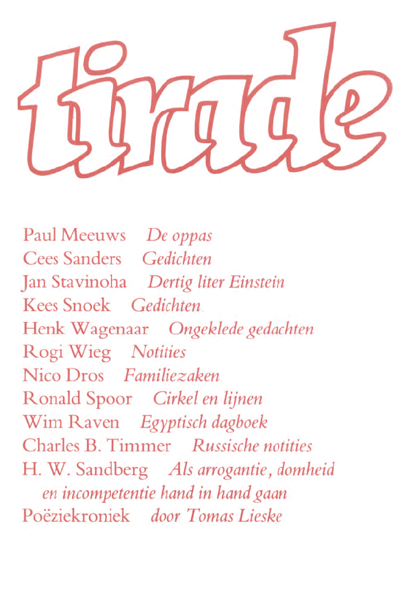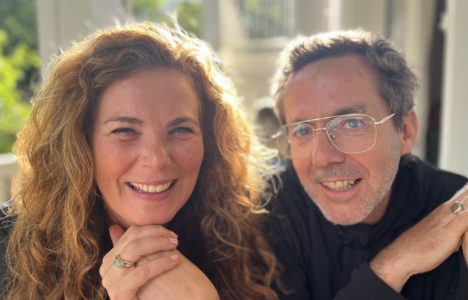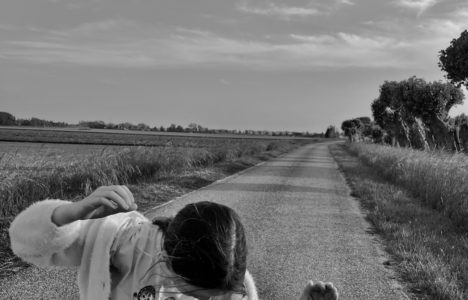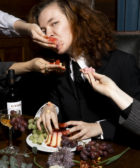Henk Wagenaar
Ongeklede gedachten
De stijlopvattingen van Rudy Kousbroek
Obviously, subject is what is said, style is how.
A little less obviously, that formula is full of faults.
Nelson Goodman
Kan een essay of roman onbeholpen geschreven zijn en desondanks boeien of ontroeren? Of omgekeerd, bestaat er stilistisch volmaakt proza – hoe men dat ook moge omschrijven – dat evenwel nietszeggend of onbeduidend is? Deze vragen, met hun enigszins verontrustende suggestie van innerlijke tegenstrijdigheid, verwijzen naar wat men zonder risico een hoeksteen van onze relatie tot het geschreven woord kan noemen: de overtuiging dat er een doorslaggevend onderscheid bestaat tussen de inhoud en de stijl van een tekst, tussen wat de schrijver zegt en hoe hij het zegt.
Nu is het met dit onderscheid tussen inhoud en stijl enigszins gesteld als met de belastingplicht of de huwelijksmoraal: er gaapt een diepe afgrond tussen de officiële leer en de praktijk van alledag. Aan de ene kant bestaat er een bepaalde vanzelfsprekende manier om over literaire stijlkwesties van gedachten te wisselen. Een soort culturele gewoontevorming die nog eens versterkt wordt indien het forum van de uitlating een openbaar karakter heeft. We komen dan uitspraken tegen als: ‘Het latere proza van Gerard Reve heeft weliswaar een unieke, onnavolgbare stijl, maar afgezien van die stijl is hetgeen hij de lezer meedeelt weinig substantieel’, waarin vorm en inhoud worden behandeld als twee afzonderlijke domeinen waarvan de onderlinge samenhang in het ongewisse blijft. Aan de andere kant echter
berust de particuliere leeservaring, het vermogen om een tekst op zijn juiste waarde te schatten, op de simultane verwerking van zowel de inhoudelijke als de stilistische aspecten van die tekst. Wat het dan ook is dat Reve de lezer in zijn brieven en romans wil meedelen, we zijn ons er op een nauwelijks gearticuleerd niveau van bewust dan het ten nauwste samenhangt met die karakteristieke ironische, archaïsche stijl van zijn proza. Met andere woorden, de boodschap is bij Reve – zoals bij ieder ander auteur – onlosmakelijk verbonden met de vorm. Het wat en het hoe in de literatuur neigen over het algemeen samen te vallen.
Het onderscheid tussen inhoud en stijl vertoont een opmerkelijke, en instructieve, overeenkomst met dat tussen ‘feiten’ en ‘waarden’. In beide gevallen beschikken we over een officieel idioom om over deze kwesties van gedachten te wisselen, maar in de verhouding tot de wereld om ons heen handelen we – zonder dat iemand zich daar rekenschap van geeft – volgens diametraal tegenovergestelde principes. In de Nederlandse taalcultuur bijvoorbeeld is de uitspraak dat Multatuli een van de twee of drie grootste vaderlandse auteurs is, alhoewel strikt genomen een waardeoordeel, evenzeer een feit als de constatering dat Couperus een ingezetene van Den Haag was. Behoudens een enkele vakfilosoof is, praktisch gesproken, niemand erg geïnteresseerd in de subtiele kennistheoretische verschillen tussen beide uitspraken. In de context van het Nederlandse literaire landschap bezitten beide de status van een ‘feit’.
Het is met het oog op deze hardnekkige discrepantie tussen de officiële theorie en de praktijk dat Hilary Putnam het onderscheid tussen feiten en waarden betitelt als ‘culturele institutie’. Daarmee bedoelt hij dat, met hoeveel overtuigingskracht je iemand ook uitlegt dat er geen enkel steekhoudend argument bestaat voor een zo absoluut onderscheid tussen feiten en waarden – of volgens gelijksoortige principes, inhoud en stijl -, er een grote kans bestaat dat die persoon je bij het eerstvolgende meningsverschil zal vragen je uitspraken te staven met ‘feiten’, of in een literaire discussie een uitspraak doet als: ‘Maarten ‘t Hart is een groot schrijver, alhoewel hij schrijft als een schooljongen’.1.
Een treffende illustratie van de opvatting dat men stijl onafhankelijk kan
beschouwen van inhoud treft men aan in een recent artikel van Rudy Kousbroek over het werk van Maarten ‘t Hart.2. Volgens Kousbroek presenteert dat werk ons met een paradox: waarom zijn ‘t Harts romans en essays zo ontroerend respectievelijk stimulerend terwijl zijn taalgebruik zo slordig en ergenisverwekkend is?
Enter Nelson Goodman. Want Kousbroeks paradox berust op die vanzelfsprekende vooronderstelling dat stijl en inhoud twee verschillende en grotendeels onafhankelijke grootheden zijn. In dit artikel wil ik nader stilstaan bij de vorm en de inhoud van een tekst en de relatie daartussen. Wat ik tracht aan te tonen is dat we op dit terrein goed doen en verkeerd spreken. In elke literaire tekst zijn inhoud en vertelmiddelen grotendeels met elkaar verweven. Niet in de gangbare, weinig ophef veroorzakende, alhoewel niet onjuiste zin van ‘Vorm en inhoud kun je wel onderscheiden maar niet scheiden’, maar in een veel verdergaande, welhaast tautologische zin. Wat ik beweer is dat in het ruimere bestek van wat een tekst uitdrukt of betekent stijl en inhoud nauwelijks onderscheidbare en vrijwel parallelle functies vervullen, dat stijl een vorm van inhoud is en inhoud een vorm van stijl. Maar allereerst een beknopte uiteenzetting van de gangbare opvatting.
In Goodmans geserreerde proza luidt het: inhoud is wat je zegt, stijl hoe je het zegt. Daarbij wordt stilzwijgend aangenomen dat eenzelfde inhoud op verschillende wijzen kan worden uitgedrukt. De bijdrage van hoe aan wat wordt dan meestal gezien als behorende tot het domein van de expressieve zeggingskracht. Voor elk idee bestaan uiteenlopende zegswijzen, grammaticale constructies, synoniemen, heteroniemen en soortgelijke die hetzelfde uitdrukken maar aan het onder woorden gebrachte idee een verschillende affectieve lading geven. Afhankelijk van publiek, stemming of gelegenheid kiest de auteur die stijlmiddelen die het door hem beoogde expressieve effect teweeg brengen. Zo, als ik hem goed begrijp, interpreteert Kousbroek ‘t Hart. Diens onbeholpen, ‘onliteraire’ stijl is een bewuste keuze. Hij zou, zo luidt de implicatie, mooier, meer ‘literair’ kunnen schrijven, maar de cultivering van een bepaalde levenshouding, door Kousbroek omschreven als ‘een fanatieke cultus van de eenzaamheid’, heeft hem doen besluiten daarvan af te zien.
Er bestaat in het Engels een metafoor die deze wijdverbreide opvatting over de verhouding tussen de techniek en de substantie van een tekst treffend onder woorden brengt: ‘language is the dress of thought’. De gelijkenis drukt uit dat gedachten zich verhouden tot taal zoals een partituur zich verhoudt tot de uitvoering ervan. De gedachte of partituur vormt een constante terwijl de taal of muzikale vertolking de invariante vorm tot uitdrukking brengt. Gesuggereerd wordt natuurlijk dat net zoals een slechte uitvoering afbreuk doet aan de esthetische kwaliteiten van de compositie, een slechte stijl de kwaliteit van het onderliggende gedachtengoed teniet doet. Dat is precies wat Kousbroek concludeert ten aanzien van ‘t Hart. De partituur is geniaal maar de vertolking is om bovenvermelde redenen gebrekkig zodat het is alsof we bij het lezen van ‘t Harts proza door een beslagen ruit kijken waardoorheen we slechts de vage contouren van zijn bijzondere gedachtenwereld kunnen ontwaren. De titel van Kousbroeks essay vat het samen: ‘Meesterwerken naverteld door een Schooljongen’.
Het voert niet te ver om te stellen dat dit idee van een vaste, onveranderlijke inhoud die met behulp van een instrument al dan niet adequaat wordt uitgedrukt de kern vormt van het hele complex van opvattingen, gewoonten, onuitgesproken veronderstellingen en onbedoelde implicaties waaruit de traditionele opvatting over literaire stijl bestaat. Het is zelfs niet moeilijk om de ontwikkeling van de taalvorsing als wetenschappelijke discipline te beschrijven aan de hand van dit onderscheid. Zo hebben de negentiende-eeuwse historische filologie en de huidige tranformationele grammatica gemeen dat zij beide, ondanks hun uiteenlopende oogmerken en methoden, op zoek zijn naar een soort structurele, onveranderlijke linguïstische code die verondersteld wordt ten grondslag te liggen aan de wereldwijde familie van moderne en klassieke talen. Daar tegenover staan de stilistische studies van Ferdinand de Saussure en zijn leerlingen, waarin de omgangstaal wordt opgevat als een schier oneindige reeks variaties op deze syntactische code, bestemd om het expressieve element van een taal tot uitdrukking te brengen.
Als een globale taakverdeling binnen een omvangrijk en gecompliceerd academisch terrein heeft het onderscheid tussen constantie en variatie,
structuur en stijl, ongetwijfeld zin. Als substantiële uitspraak over de verhouding tussen taal en denken berust het op een fataal misverstand. Want hoe moeten we ons denken zonder taal voorstellen? Undressed thought? Het geloof in een van de taal onafhankelijke waarneming is het geloof in wat in de door Maarten ‘t Hart zo verfoeide psychologie wordt aangeduid met de term ‘the innocent eye’, het idee dat de wereld zoals we die waarnemen onafhankelijk van onze waarneming bestaat. Maar, hoezeer dit aanvankelijk ook indruist tegen onze intuïtieve opvattingen, er bestaat niet zoiets als ‘perceptie zonder conceptie’.3. We scheppen de werkelijkheid naar het woord. De wereld zoals die zich aan ons voordoet is onlosmakelijk verbonden met taal, of in bredere zin, symbolen, verbaal en anderszins, en in de volle betekenis van het woord is de wereld een gedachtenbeeld. Dit is geen pleidooi voor solipsisme, het geloof dat de wereld een hersenschim is en dat er buiten de waarnemer geen wereld bestaat, maar voor de simpele en bij enige overdenking weinig controversiële stelling dat de werkelijkheid een interpretatie is. Echter, en dit is essentieel, het betreft hier een gedeelde, collectieve interpretatie. En zoals alle interpretaties wordt ook deze bij voortduring getoetst op zijn plausibiliteit. Wat werkt nemen we op in ons wereldbeeld, wat niet (meer) werkt verdwijnt achter de horizon van de geschiedenis. Wat we doorgaans aanvaarden als universeel en tijdloos is in feite lokaal en historisch bepaald. Er zijn woorden zonder werkelijkheid, maar een woordloze werkelijkheid is even ongerijmd als geluidloze muziek.
Nu de begripsmatige waterscheiding tussen denken en taal onhoudbaar blijkt wordt het duidelijk dat er niet zoiets bestaat als stilistische variaties op een gelijkblijvend thema. Net zoals de definitieve versie van dit artikel niet hetzelfde uitdrukt als eerdere probeersels, is het twijfelachtig of qua stijl uiteenlopende versies van een gedachte precies hetzelfde betekenen.4. We kunnen natuurlijk overeenkomen dat praktisch gezien de semantische verschillen tussen verschillende versies verwaarloosbaar zijn, maar dat neemt niet weg dat ze er, hoe onbeduidend dan ook, wel degelijk zijn. En, zoals ik hieronder zal laten zien, in de meeste gevallen zijn die verschillen in betekenis verre van verwaarloosbaar. Daarvoor is het echter noodzakelijk dat ik
stilsta bij wat het betekent voor een tekst om te betekenen. Laat ik beginnen met een voorbeeld.
In Amerikaanse schoolboekjes voor het onderwijs in de Engelse letterkunde, heb ik me laten vertellen, treft men dikwijls de volgende zinsnede aan:
‘the landscape of holland is full of ears’
De zinsnede is bedoeld ter demonstratie van beelspraak. De verbaasde leerlingen, die naar de betekenis van de zin moeten raden, mogen na enige doorgaans vruchteloze discussie de bladzijde omslaan, waarop dan het volgende zichtbaar wordt:
THE LANDSCAPE OF HOLLAND IS FULL OF EARS.
THE LANDSCAPE OF HOLLAND IS FULL OF EARS.
‘THE LANDSCAPE OF HOLLAND IS FULL OF EARS.
‘Oh, windmills!’ luidt gewoonlijk hun reactie. Dezelfde uitspraak maar verschillende grafische vormgeving. En in het tweede geval onmiddellijke herkenning. Oren blijken de verzinnebeelding van molenwieken te zijn. Voor mijn betoog is dit voorbeeld echter op andere wijze relevant. Niemand zal willen aanvechten dat de beide uitspraken volstrekt synoniem zijn. Het is zelfs zo dat ze grammaticaal identiek zijn en slechts verschillen ten aanzien van een kenmerk dat er voor wat betreft de inhoud van de uitspraak niet op aan komt, namelijk de grafische vormgeving. Desalniettemin zal niemand ontkennen dat de tweede uitspraak zijn geheimen gemakkelijker prijsgeeft, dat wil zeggen rijker aan betekenis is, dan de eerste. Op een of andere manier draagt de vorm van de uitspraak in dit geval wel bij aan de inhoud. Het ziet er met andere woorden naar uit dat inhoud, wat
een uitspraak zegt, en vorm, hoe een uitspraak eruit ziet, beide onontbeerlijk zijn voor wat een uitspraak betekent. Wat dit voorbeeld echter niet laat zien is hoe een uitspraak betekent, hoe inhoud enerzijds en vorm of stijl anderzijds zich naadloos samenvoegen tot betekenis. Daartoe een tweede, meer levensecht, voorbeeld.
Een politieke bijeenkomst. Aan de orde is de door de minister van Welzijn, Volksgezondheid en Cultuur voorgenomen afschaffing van de Beeldende Kunstenaars Regeling (bkr), in de volksmond beter bekend als contraprestatie. In de reeks van verontwaardigde sprekers laten we er drie aan het woord. Nummer een: ‘Ik ben tegen het verdwijnen van de contraprestatie!’ Nummer twee: ‘Ik ben van mening dat de voorgenomen opheffing van de bkr heroverweging verdient van de zijde van de minister’. Nummer drie: ‘Met het betreurenswaardige voorstel tot afschaffing van de bkr kiest de overheid expliciet voor de koopmanszijde van ons nationaal karakter’. Drie varianten op de boodschap: Ik ben tegen de afschaffing van de bkr. Bij een gelijkblijvende inhoud verandert slechts de expressieve kleur, de emotionele inhoud van de drie uitspraken van respectievelijk boos, naar voorzichtig, naar moreel verontwaardigd.
Of toch niet? In de traditionele opvatting vormt synonymie een voorwaarde voor stijl.5. De veronderstelling dat verschillende uitdrukkingswijzen een gelijkblijvende betekenis hebben en dat een schrijver daar doelbewust uit kiest om een gedachte zo effectief mogelijk onder woorden te brengen kan worden opgevat als een wat omslachtige definitie van stijl. Maar in hoeverre is er sprake van werkelijke synonymie in het bkr-voorbeeld? Het is duidelijk dat er in alle gevallen meer wordt uitgedrukt dan dat de spreker gekant is tegen een bepaald voornemen van de overheid. Het eerste voorbeeld suggereert in zijn grammaticale eenvoud en no-nonsensevorm een soort onverzettelijkheid en een oppositionele houding die verder strekt dan alleen het bkr-voorstel. Het taalgebruik in het tweede voorbeeld, omslachtig, krom, gekenmerkt door ambtelijk jargon en gewichtigdoenerij, roept een gevoel van ongemak op, de associatie met iemand die zich in bochten wringt, die de kool en de geit wil sparen. Waarschijnlijk een partijgenoot van de gewraakte minister, die weliswaar gekant is tegen
de voorgenomen maatregel maar tegelijkertijd zijn politieke bondgenoot niet voor het hoofd wil stoten. Het derde voorbeeld tenslotte roept het beeld op van de zich boven de partijen wanende literaire criticus die tegelijkertijd verantwoordelijkheidszin wil uitstralen en de van hem verwachte polemische prestatie leveren. Net als in het windmolenvoorbeeld ‘betekent’ iedere uitspraak meer dan zijn geabstraheerde inhoud en stilistische elementen dragen daartoe in belangrijke mate bij.
Het punt is echter – en dit is essentieel voor mijn betoog – dat niemand, dat wil zeggen niemand die tot de Nederlandse taalcultuur behoort, deze extra-betekenissen ook maar een moment zullen ontgaan. Iedereen die met enige regelmaat de krant leest of naar de televisie kijkt herkent aan de voorbeelden in een oogopslag de tegendraadse kunstenaar, de draaierige cda-politicus, en de zelfgeproclameerde cultuurfilosoof à la K.L. Poll. De crux van mijn redenering zit hem in de frase ‘in een oogopslag’, want de herkenning van al die bijkomende betekenissen van een uitspraak moet worden gezien als een soort onwillekeurige semantische reflex, een activiteit zoals lopen of fietsen die door vrijwel iedereen tot in de perfectie wordt beheerst maar waarvan we, indien we er over worden ondervraagd, niet kunnen vertellen hoe we het precies doen. Een vaardigheid die zo vanzelfsprekend is dat we uit het oog verliezen dat ze een voorwaarde vormt voor het feitelijk begrip van een uitspraak per se.
Waarop berust dit vermogen om tussen de regels door te lezen, om in één keer de meervoudige betekenissen van een tekst of uitspraak te herkennen? Aan de omstandigheid zo luidt het antwoord, dat die tekst of uitspraak niet los kan worden gezien van een bepaalde achtergrond of context. Het feit dat we een artikel van Kousbroek of een autobiografisch fragment van ‘t Hart begrijpen in al hun diverse betekenissen berust op het gegeven dat lezer en auteur dezelfde culturele achtergrond hebben en daar een broep op doen, laatstgenoemde om betekenissen te scheppen, eerstgenoemde om ze te verstaan. Dat er zonder die gedeelde achtergrond nauwelijks van betekenis sprake is wordt door niets zo treffend geïllustreerd als door onze reactie tegenover een tekst afkomstig uit een literaire cultuur, zoals de Indiaanse of Chinese, die relatief ver van de onze verwijderd is. Zulke teksten plaatsen ons, in de woorden van Elsschot, voor
een muur waarin geen deur zit, en we komen dan meestal ook niet veel verder dan een beoordeling op grond van een vaag soort algemene esthetische kriteria die volledig aan de nuances van het origineel voorbij gaan en niet zelden aanleiding geven tot wanhopige misverstanden omtrent de betekenis van de tekst.
Het zal nu duidelijk zijn dat het traditionele schema ontoereikend is om te verklaren wat een tekst zegt. Een tekst zegt iets en wat gezegd wordt berust op inhoud zowel als stijl. Alle drie – inhoud, stijl en betekenis – berusten op, gedeelde, context. Uit de aard van context volgt dat zij wordt gesuggereerd veeleer dan gezegd, en stijl is daartoe het aangewezen middel. Nog eenmaal het bkr-voorbeeld.
Elk van de drie uitspraken, heb ik geconcludeerd, bestaat niet uit een onveranderlijke inhoud met expressieve variaties, maar dient te worden opgevat, a fortiori wanneer we er extra-grammaticale elementen als stemverheffing, uitspraak, dictie en mimiek bij betrekken, als een dichtgeweven web van simultane betekenissen. Nu is het zo dat een ieder die schrijft, weet dat verhaal en vertelmiddelen niet onafhankelijk van elkaar ontstaan. Het zoeken naar de juiste zinswending is een gelijktijdig zoeken naar inhoud en stijl. In sommige situaties, met name als de ‘extra’ betekenissen van een gesproken of geschreven tekst in strijd lijken te zijn met de primaire boodschap, heeft de uiteindelijk bereikte balans tussen substantie en techniek veel weg van een slechts ten dele geslaagd compromis. Wie de kool en de geit wil sparen moet wel spreken in omslachtige, ingewikkelde frasen. Wie voor wijs wil doorgaan en polemisch schrijven ontkomt niet aan een noodzakelijkerwijs nietszeggend, elliptisch taalgebruik. Maar de rhetorica van de marktplaats slaagt er meestal maar ten dele in om de verborgen boodschap, de heimelijke bedoeling, te maskeren. In zulke gevallen zegt een uitspraak niet slechts iets over wat de spreker denkt, maar ook over de spreker zelf, zijn overige opvattingen en denkbeelden, zijn onuitgesproken voornemens, zijn karakter, zijn morele stellingnames, zijn emotionele betrokkenheid bij de zaak, enzovoorts. Het overgrote deel van deze informatie wordt eerder gesuggereerd dan op de man af meegedeeld. Elke uitspraak is, onontkoombaar, meer suggestie dan explicatie.
Het argument luidt nu dat al die voornoemde ‘extra’ betekenissen, al die onbedoelde, heimelijke, tegenstrijdige en soms zelfs voor de schrijver verborgen boodschappen die een tekst ‘tussen de regels door’ bevat, als het ware de tekst binnensluipen via het medium van de stijl. Dit berust op de omstandigheid dat stijlkenmerken deel uitmaken van wat je zou kunnen noemen het collectieve bezit van een taalcultuur. De vormaspecten van een tekst (of, volgens gelijksoortige principes, van architectuur, kleding of beeldende kunst) fungeren voor de leden van die cultuur als herkenningstekens die aangeven wie men is en hoe men verstaan wenst te worden, min of meer analoog aan de functie die bijvoorbeeld baltsgedrag bij sommige diersoorten vervult.
Dit druist dus opnieuw in tegen de traditionele opvatting dat de schrijver onder alle omstandigheden een onbelemmerde keuze heeft uit alternatieve, gelijkluidende uitdrukkingsmogelijkheden. Het is integendeel zo dat de stijl van een uitspraak dikwijls voor een groot deel is voorgeschreven. Dat is met name het geval indien de schrijver of spreker een duidelijk herkenbare maatschappelijke rol belichaamt, zoals bijvoorbeeld de Dominee, de Welzijnswerker, de Manager, de cda-Politicus, of de Sociaal-Democraat. Alasdair MacIntyre duidt zulke herkenbare sociale ‘typen’ aan met de term ‘characters’ en betoogt dat deze, omdat ze voor het grote publiek een soort cultureel en ethisch ideaal vertegenwoordigen, slechts over een zeer beperkt repertoire van openbare uitlatingen en gedragingen kunnen beschikken.6. Een ‘character’ is dermate afhankelijk van zijn publiek dat hij, wil hij erdoor verstaan worden, nauwelijks of niet kan afwijken van de stilzwijgend overeengekomen orde van uitdrukkingen en zegswijzen. In zulke situaties gaat het in de eerste plaats om herkenning en geruststelling. Het gehoor is niet zozeer geïnteresseerd in de substantiële boodschap van de spreker maar vooral of hij erin slaagt om op overtuigende wijze gestalte te geven aan de attributen die bij zijn rol behoren. De traditionele verhouding tussen stijl en inhoud is in zulke gevallen natuurlijk volledig op zijn kop gezet: stijl is inhoud. Wat is volledig herleid tot hoe.
Wat ik tot dusverre betoogd heb, laat zich in één zin samenvatten: stijl is tot
op zekere hoogte inhoud en inhoud stijl; tezamen vormen ze betekenis. Maar betekent die verwevenheid van stijl en inhoud nu dat beide metterdaad identiek zijn en dat het gehele onderscheid berust op een misverstand? Het antwoord is natuurlijk nee. Het is zeer wel mogelijk, en dikwijls uitermate inzichtgevend, om de karakteristieke, wederkerende elementen in het taalgebruik van een auteur te achterhalen. Het gaat mij, zoals ik hiervoor al zei, om de relatie tussen stijl en inhoud en met name het wijdverbreide vooroordeel dat beide onafhankelijk van elkaar zijn, alsmede de bijbehorende implicatie dat het mogelijk is, zoals Kousbroek in zijn beschouwing over ‘t Hart suggereert, om de stijl van een auteur te beoordelen ‘in vacuo’, dat wil zeggen zonder ook de denkwereld van die auteur in het oordeel te betrekken. Mijns inziens is het tegendeel veel voor de hand liggender: een oordeel over de stijl van een auteur houdt onvermijdelijk een oordeel in over wat die auteur substantieel te zeggen heeft.
Het merkwaardige is, en dit is waarschijnlijk kenmerkend voor de kanonieke status van de gangbare stijlopvatting, dat Kousbroek dat zelf niet ziet. Er is met de voorbeelden van ‘t Harts taalgebruik die hij aandraagt wel wat meer aan de hand dan alleen het taalgebruik. ‘t Harts boutade over beroepsmusici en zijn verslag over de ontwikkeling van zijn muzikale voorkeuren zijn niet zozeer voorbeelden van slecht taalgebruik, maar verraden bovenal een banale en onvoldragen ideeënwereld.
In zekere zin is Kousbroeks misverstand een gevolg van zijn methode. Door zijn analyse te baseren op slechts een enkel fragment van ‘t Harts oeuvre, is het mogelijk om het kreupele taalgebruik te zien als een incidentele zonde en te denken: leuk idee, jammer dat het zo onbeholpen onder woorden is gebracht. Maar het gevaar is natuurlijk dat door die nadruk op een of twee tekstvoorbeelden het organisch verband dat die fragmenten onderhouden met het volledige werk aan het oog onttrokken wordt. Ondanks zijn treffende typering van ‘t Harts stijl (‘de net-niet-rake formuleringen, de half afgemaakte gedachten, de non-sequiturs, de vergalopperingen als gevolg van haast of slordigheid, de gemakzuchtige clichés’) ziet Kousbroek over het hoofd dat die slechte stijl geen bijkomstigheid is maar rechtstreeks voortkomt uit, wat ik zou willen noemen, de methodologie waarop de bron van die citaten berust, ‘t Harts memoires Het Roer Kan Nog Zesmaal Om.
Geschiedschrijving, zowel van algemene als persoonlijke aard, behoeft een methode, een aantal intellectuele strategieën, om de ongeordende massa historische gegevens toegankelijk te maken en samen te binden tot een overtuigend verhaal. ‘t Harts memoires vormen natuurlijk geen uitzondering op dit principe, maar het curieuze is dat aan zijn methoden iets insolvabels kleeft, alsof het ze ontbreekt aan de voor verantwoordelijke geschiedschrijving vereiste betrouwbaarheid en soliditeit. Zo zijn deze memoires bijvoorbeeld schaars aan afgewogen argumenten waarin recht wordt gedaan aan de subtiliteiten en tegenstrijdigheden die de meeste situaties kenmerkt, en zoekt de auteur keer op keer zijn toevlucht tot het oprichten en met veel misbaar weer neersabelen van stromannen. De veelvuldig in het boek naar voren gebrachte opinies lijken voornamelijk te zijn geformuleerd vanwege hun antagoniserende werking met voorbijgaan aan eisen van bezonkenheid en overtuigingskracht. Het merendeel van ‘t Harts literaire portretten kenmerken zich door hetzij rancune, hetzij idolate bewondering en verkrijgen daardoor al spoedig iets vlaks en voorspelbaars. En daarnaast zijn er de welbekende kwaadaardige uitvallen naar allerlei groepen en individuen, het pedante etaleren van zijn specialistische kennis, de sweeping generalizations, de onbedwingbare zucht naar volledigheid, enzovoorts.
‘t Hart creëert in zijn memoires een wereld, maar met methoden die op zijn zachtst gezegd te denken geven. Het is alsof hij een zekere distantie tot zijn onderwerp ontbeert, het subtiele evenwicht tussen betrokkenheid en emotionele afstand dat noodzakelijk is om het onderwerp uit te tillen boven het niveau van de anecdotiek en de persoonlijke tirade. Ik denk dat dat ook die onoprechte toon, die nauwelijks verholen zelfgenoegzaamheid verklaart die zo kenmerkend zijn voor deze memoires en zo veel van ‘t Harts proza. Vanuit dit oogpunt is er natuurlijk geen sprake van dat je over het onbeholpen taalgebruik zou kunnen heenstappen om de interessante ideeën en stimulerende gedachten erachter te ontwaren. Het probleem is door de oppervlakte heen doorgedrongen tot de intellectuele en emotionele kern van het werk. Of beter, het ontspringt daar en manifesteert zich in de vormelementen ervan. Methode, stijl en inhoud zijn bij ‘t Hart, zoals bij iedere auteur, onlosmakelijk met elkaar verbonden. Ik vrees dan ook dat
zijn taalgebruik ons geenszins plaatst voor een paradox en dat er achter de kreupele stijl geen meesterwerken schuil gaan. Integendeel, stijl en inhoud van deze memoires komen, zoals te verwachten valt, volmaakt overeen en ze bevatten niets wat er niet staat. Het zijn de ongeremde ontboezemingen van een schooljongen.
Brookline, Massachusetts, december 1986
- 1.
- Vgl. Hilary Putnam, ?Fact and Value?, in Reason, Truth and History, Cambridge, 1981: 127: ?By calling the dichotomy a cultural institution, I mean to suggest that it is an unfortunate fact that the received answer will go on being the received answer for quite some time regardless of what philosophers may say about it, and regardless of whether or not the received answer is right. Even if I could convince you that the fact-value dichotomy is without rational basis, that it is a rationally indefensible dichotomy, or even if some better philosopher than I could show this by an absolutely conclusive argument (of course there are no such in philosophy), still the next time you went out into the street, or to a cocktail party, or had a discussion at some deliberative body of which you happen to be a member, you would find someone saying to you, ?Is that supposed to be a statement of fact or a value judgement?? The view that there is no fact of the matter as to whether or not things are good or bad or better or worse, etc. has, in asense, become institutionalized. (cursief in origineel, hw)
- 2.
- Rudy Kousbroek, ?Meesterwerken Naverteld Door Een Schooljongen?, nrc, 17 oktober 1986.
- 3.
- Zie Jerome Bruner, ?Under Construction?, New York Review of Books, March 27, 1986:46.
- 4.
- Vgl. Graham Hough, Style and Stylistics, London, 1969: 4: ?…the more we reflect on it the more doubtful it becomes how far we can talk about different ways of saying; is not each different way of saying in fact the saying of a different thing?? (cursief in origineel)
- 5.
- Vgl. bijvoorbeeld Stephen Ullman, Style in the French Novel, Cambridge, 1957, 6: ?There can be no question of style unless the speaker or writer has the possibility of choosing between alternative forms of expression. Synonymy, in the widest sense of the term, lies at the root of the whole problem of style?.
- 6.
- Vgl. Alasdair McIntyre, After Virtue, Notre Dame, 1981: 26: ?Characters specified thus must not be confused with social roles in general. For they are a very special type of social role which places a certain kind of moral constraint on the personality of those who inhabit them in a way in which many other social roles do not… In the case of a character role and personality fuse in a more specific way than in general; in the case of a character the possibilities of action are defined in a more limited way than in general.? Voor een even vermakelijke als educatieve typologie van karakters in het wetenschappelijk onderzoek, en een illustratie van het feit dat Objectieve Waarheid evenzeer afhankelijk is van stijl als inhoud, zie Johan Barendregts vertaling van, en aanvulling op, de Karakters van Theophrastus.






